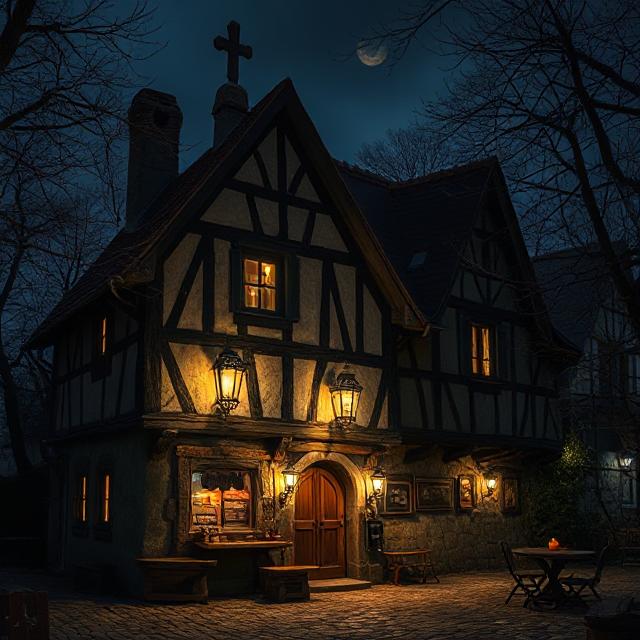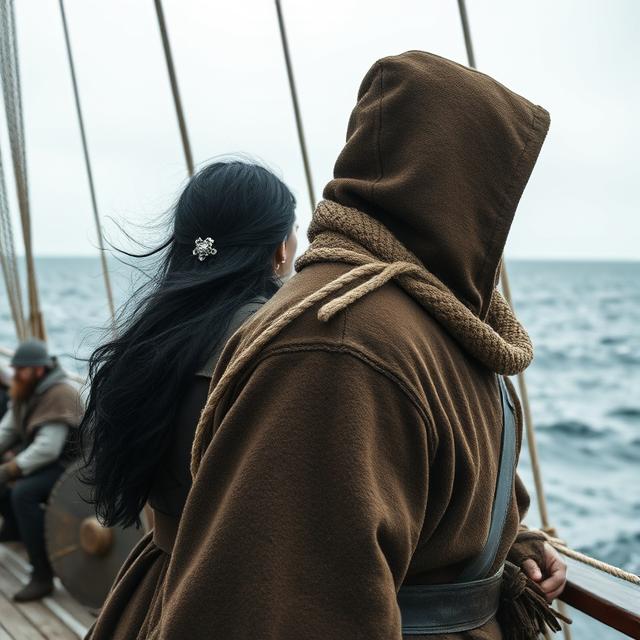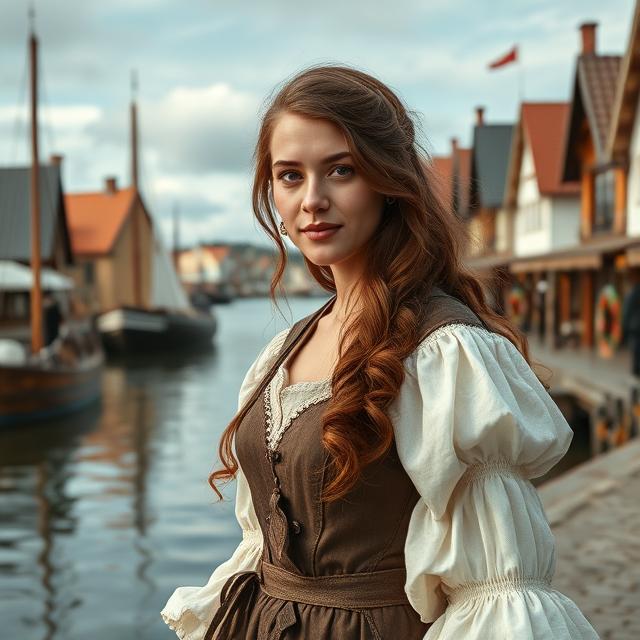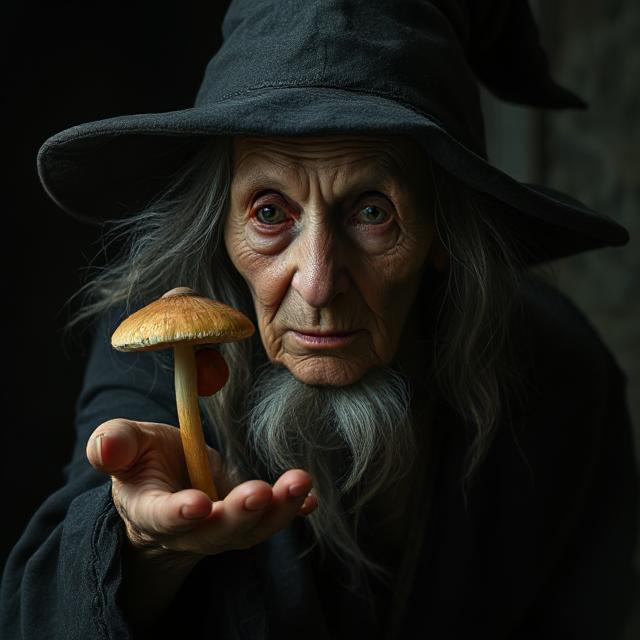The road ahead is long, uncertain, and dangerous—but at last, it is yours to walk with resolve.
The road north is a living thing, stretching endlessly through forest, field, and river. Each step is weighted with memory, each mile echoing with the cries of gulls, the crash of distant waves, and the ghost of Moravice. You travel by night when the moonlight shimmers on the ground, and by day you hide in the hollow of woods or the remnants of abandoned villages. The world is empty and hostile; no one dares speak your name aloud, and yet every shadow seems to whisper it.
Tracking Margaret is not a straightforward task. You know she is alive—there is no doubt—but she moves as if she has learned from your mistakes, vanishing before you can reach her. The towns you pass through offer only fragments of rumor: a woman with dark hair seen boarding a ship, a voice speaking your name in fear, a fleeting figure slipping through a market at dusk. You spend coin freely, bribing merchants, innkeepers, and boatmen, trying to uncover her path, following whispers like threads through a labyrinth. Each clue seems just beyond your grasp, a reflection in water that shatters the moment you reach for it.

At night, sleep brings dreams of her: her laughter ringing above the smoke of ruined halls, her hands clasped over her mouth as she calls your name, her eyes filled with silent questions. Sometimes you awaken clutching the air, certain she is there beside you, only to find the cold dawn pressing against your face. And yet the vision of her drives you onward, through snow-matted fields and forests whose branches scrape against your cloak, through rivers swollen with spring meltwater, through towns that stare and turn away.
Weeks pass. Your purse lightens with each bribe, your body grows leaner and rawer with fatigue. And then, at the edge of a northern border town, you see it—a trace of her journey, subtle and unmistakable. A cloak snagged on a fencepost, a mark in the mud from a riding boot, the remnants of a hastily abandoned camp. You move with a careful urgency, following the trail as though it were the pulse of a living thing. Night descends, and still you follow, guided only by instinct and the faint hope that has kept your heart beating all these months.
Finally, in the quiet hollow of a forest clearing, you see her. Margaret. She stands beneath a gnarled oak, the moonlight catching the curve of her face, her eyes wide with disbelief and exhaustion. Tears shine in their depths. She has waited, perhaps expecting you never to come, perhaps hoping you would fail, perhaps fearing the relentless reach of Claudius.
You dismount silently, your horse lowing in the dark, and step forward. She turns, and for a moment neither of you speaks. The world seems to hold its breath. Then she moves, stumbling, running, and the next instant her arms are around you.
“I knew you would come,” she whispers against your chest, voice breaking. “I dared not hope, yet—”
You hold her close, pressing your lips to her hair. “I told myself I would never stop,” you reply, voice rough with fatigue and relief. “I could not leave you, not again.”
The night stretches around you, the forest deep and silent. You sit there beneath the oak, letting the hours pass, letting the weight of months of searching fall away into the earth beneath your feet. Margaret rests her head against your shoulder, and for a brief moment, the world outside the trees does not exist.
By first light, you set out for Aldebryn. The journey is careful; each village is scouted before entering, each river crossed with caution. Margaret rides beside you, silent but steady, her presence a balm to the wounds that travel has carved into your body and mind. She shares what little she knows of her hiding places, of the families who sheltered her, of the constant fear of being discovered. Together, you navigate through the shadows cast by Claudius’ empire, careful not to attract attention, careful to preserve the fragile safety you have found.


When you reach a bustling port city on the southern coast, relief and caution intertwine. Margaret’s family is already there: her parents, her brother and sister, all gathered at the harbor, their faces a mixture of joy, relief, and quiet fear. They rush forward as you and Margaret dismount, embraces given freely, tears flowing without restraint. The air is salty with the sea, with smoke from the docks, with the emotion that binds the family together again.
For the next weeks, life settles into a rhythm you did not expect. You find lodging in a quiet part of the city, removed from the main thoroughfares, and you and Margaret move among her relatives with caution and care. The market is noisy, the port alive with trade, yet a fragile peace blankets your days. You rise at dawn to walk along the harbor, tracing the edges of the city walls, watching the ships sail out into the open water. You and Margaret share meals, quiet conversations, laughter that comes slowly but genuine, moments where the shadow of Moravice and Claudius’ reach seems far away.
Yet Claudius’ presence is never absent from thought. You know he will come, eventually, to find the last remnants of those he considers enemies. His reach is long, his patience infinite, and you understand that this calm is borrowed, fragile, temporary. Every morning you wake, you check the streets and the docks, assessing risk, measuring loyalty, and teaching Margaret the small lessons of vigilance that have kept you alive.
And still, there is joy. You watch her laugh with her family, see the way the youngest niece clutches Margaret’s hand, hear her father’s voice softening in conversation. You find a stolen peace in the rhythm of daily life: preparing meals, walking the quay, mending sails with the fishermen, listening to the gulls and the waves. You allow yourself to hope that some fragment of safety can exist here, that the years of fear and loss have not erased the possibility of happiness entirely.
At night, you and Margaret sit together on the balcony of your lodging, gazing out at the harbor. The lanterns sway in the breeze, the ships’ masts like shadows reaching toward the stars. You speak little, letting the sound of the water fill the spaces between you. The crow in your chest, once so insistent, now rests, its wings folded in silence. You touch her hand, warm against yours, and feel the solidity of the present—the only truth that exists.
You know the storm will come. Claudius will not rest. His soldiers, spies, and assassins will scour the lands in search of you, in search of Margaret, in search of the last remnants of Moravice’s legacy. But for now, the danger is a distant drumbeat, muffled by the walls of family and the rhythm of everyday life. You have found her. You have reclaimed something worth protecting.
And in this quiet, fleeting peace, you remember that survival alone is not enough. To live fully is to love, to share, to witness and be witnessed. You have lost Moravice, you have lost friends and allies, and the Emperor’s wrath stretches like a shadow over every horizon—but here, in the narrow streets of this port city, with Margaret by your side and her family around you, you have found a moment of life, unclaimed by fear.
The weeks pass slowly. You speak of the past only when necessary, and even then sparingly. Margaret shares her own tales of hiding and fear, of kindnesses and cruelties encountered along the way. You teach her to trust the world cautiously, as you have learned to do, but also to seek joy where it can be found. You walk along the docks, watch the sun set over the water, and sometimes, in silence, you let yourself imagine a future not shadowed by Claudius’ reach.
It is not peace in its fullest sense. You know it is borrowed, stolen, temporary. But it is enough for now. Enough to rest, to breathe, to gather strength, to remember that life can still exist beyond fear, and that love, fragile and human, can bloom even amidst the ruins of empire.
And as the days lengthen and the harbor hums with life, you sit beside Margaret, feeling the warmth of her hand in yours, and understand that this, however fleeting, is what you have fought for all along. A quiet stolen peace, a reprieve from the shadow of power and vengeance, a chance to exist simply, fully, and together.
Dawn seeps over the sea as the servants announce a visitor.
She is old — impossibly old. Her cloak is faded violet wool, hem heavy with sand and seaweed. Her eyes are sharp and gray, like steel that has seen too much battle. She carries a small wooden bowl.
Margaret frowns at her appearance but allows her in. “You’ve come a long way, Mother,” she says politely, though the edge in her tone is clear.
The woman bows, then turns her gaze to you. “You are the Duke of Zalenice,” she says. “The one who lived when he should have died.”
Her voice is steady, low, with an accent you cannot place.
“I am,” you reply. “Who are you?”
“Once,” she says, “I am Magus to your father.”
The room goes still. Margaret’s breath catches.
“That’s not possible,” you say. “My father’s Magus died years ago, before my exile.”
Her lips curve faintly. “We die in one way, live in another. He sends me before the fall — to carry something for you.”
She extends her hand toward you. Within it lies a single mushroom.

Margaret steps back. “What is this?”
The old woman’s eyes do not leave yours. “A key,” she says. “Eat it, and the truth will be revealed to you.”
“What truth?” you ask.
“The truth of your parents. Of their fate. Of your destiny.”
Margaret’s hand tightens around your arm. “Don’t listen to her. This is sorcery. Trickery. You’re safe here. You don’t need her riddles.”
But the word parents hangs in the air like a tolling bell.
The Magus waits, calm, unblinking. “You wonder every night whether they live or die. Whether your path to Aldebryn was mercy or mistake. You ask the sea for answers. The sea does not speak. But the old world does — if you listen.”
She moves closer. The mushroom’s glow pulses faintly, like a heartbeat.
Margaret steps between you. “No,” she says sharply. “He’s done with blood and fate. Whatever you offer, it’s poison.”
The old woman regards her coolly. “You love him. That is clear. But love cannot silence the truth.”
Your heart thuds painfully.
“What will I see?” you ask.
“Everything,” says the Magus. “The night your parents vanish. The bond that ties you still to Zalenice and to what lies beneath it. The shadow that follows you — the crow. You will understand why it does not leave.”
Her words sink deep, coiling in your mind like smoke. The crow. You have dreamed of it since the desert — its eyes, patient and endless.
Margaret looks at you, pale. “You don’t need this. You have me. You have peace.”
Peace. Yes, the word begins to taste like ash.
“I don’t know if I can live without knowing,” you say quietly.
The Magus nods once. “Then you are ready.”
She sets the bowl on the table and steps back. The mushroom seems to hum softly, its glow reflecting in the silver goblets nearby.
You stare at it, throat dry. Is it madness to believe this woman? To trust in magic when kingdoms fall to steel and deceit? Yet the pull is undeniable — the same hunger that drives you across deserts, into wars, into loss.
Margaret’s voice breaks the silence, trembling: “If you take it, you may never come back. Whatever she shows you, it will change you.”
You turn to her, eyes meeting hers. “Maybe I’ve already changed,” you say.
She reaches for your hand, desperate. “Don’t do this.”
You hesitate. The sea murmurs beyond the window, waves slapping against the stone pier. Somewhere in the distance, gulls scream.
You think of your parents — your mother’s soft voice, your father’s steady hand on your shoulder, the last words before your exile. You think of Claudius, of the Magus in Zalenice, of the prophecy whispered in your dreams.
What if this is the key to it all? What if the truth has been chasing you, waiting for this moment?
Your hand hovers above the bowl.
The mushroom pulses once, like a living thing.
Margaret turns away, covering her mouth. “Please,” she whispers. “Don’t.”
The Magus only watches, eyes cold as moonlight.
The world narrows to the curve of the bowl, the faint light, the choice.
To eat, and know.
Or refuse, and live blind.
The air thickens, heavy with salt and silence. You hear your heartbeat, the echo of your father’s voice, the distant cry of the crow.
You reach forward.
And then — you stop.
The Magus’s expression does not change, but her voice softens now, almost kind. “There is no shame in fear. But truth waits for no one.”
Your fingers tremble above the glow.
Margaret weeps silently beside you, tears falling like rain against the stone floor.
The sea roars outside, relentless and eternal, as if calling you back to the path you have tried so hard to leave behind.
You draw a breath — one that can change everything.
And the mushroom’s light flickers once more, inviting.
…..
